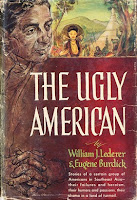| Day one of the 2009 MLB campaign and the Cubs are in first place with a 4-2 victory over the Houston Astros! A lead-off home-run from Soriano, coupled with "staff ace" Zambrano hurlig 97 pitches over six innings (his control wasn't too bad, 6 Ks to only 3 walks) to get the win, followed by closer Kevin Gregg's first save as a Cub (despite giving up 2 hits and an earned run) made for an exciting opening day game. |
I know it is too early to start thinking about the playoffs, and after the Cubs collapsed the last two Octobers -- I don't have any right to be optimistic, but despite my common sense, I know this is going to be our year! But, with a rotation that features Carlos Zambrano, Ted Lilly, Ryan Dempster, and Rich Harden, the Cubbies will have one of the better starting rotations in the division. I think keeping the starting pitchers healthy will be the key to a successful 2009 season.
Now, I wouldn't be a true Cubs fan if I didn't have a grumble or two, so the one thing I am disappointed about is that Sam Zell and the Tribune Company still own the team. The franchise has been on the auction block for nearly two years, but it looks like the Ricketts family will be the owners sometime this Spring, but the fact that Zell is still in charge is a huge disappointment (maybe more so than the playoff collapse against the Dodgers last October).
At any rate, there is light at the end of the ownership tunnel (finally!) As Tom Ricketts, a native Chicagoan and life-long Cubs fan, stated goal is to “...win a World Series and build the consistent championship tradition that the fans deserve.” The change in ownership can't come too soon for me.
On the field side of the equation, I am sad that we lost Derosa and Wood. I know why the Cubs let Kerry go, but really hope that Fontenot will be able to step up and replace Derosa at second base--our losses are Cleveland's gains... That said, the acquisition of Bradley, Gregg and Miles during the off season should be interesting. Jim Hendry is either going to look like a genius, or a complete fool. I know Bradley was a headcase in Los Angeles (and everywhere else really too), but he can produce offensively, and if Lou can get his head straightened out, so much the better. Overall, I'll say that, on paper, the off-season's plusses certainly outweigh the minuses.
Some offensive tweaks, for a team that had the best 2008 regular season record in the National League, coupled with five Cubs' starters who can be dominant, and a combination of Marmol and Gregg closing out the late innings, means we should be in very good shape this year!
I hate to say World Series title contender in April, but 90 wins should lock up the Central Division and if the bullpen can step up and save some wear-and-tear on the starting rotation, the 101 year drought will be over. I know this is going to be our year!
That is of course, if we can get past the Curse of the Billy Goat, damn you Billy Sianis! Why did you have to go and bring a goat to the World Series?!
Now, I wouldn't be a true Cubs fan if I didn't have a grumble or two, so the one thing I am disappointed about is that Sam Zell and the Tribune Company still own the team. The franchise has been on the auction block for nearly two years, but it looks like the Ricketts family will be the owners sometime this Spring, but the fact that Zell is still in charge is a huge disappointment (maybe more so than the playoff collapse against the Dodgers last October).
At any rate, there is light at the end of the ownership tunnel (finally!) As Tom Ricketts, a native Chicagoan and life-long Cubs fan, stated goal is to “...win a World Series and build the consistent championship tradition that the fans deserve.” The change in ownership can't come too soon for me.
On the field side of the equation, I am sad that we lost Derosa and Wood. I know why the Cubs let Kerry go, but really hope that Fontenot will be able to step up and replace Derosa at second base--our losses are Cleveland's gains... That said, the acquisition of Bradley, Gregg and Miles during the off season should be interesting. Jim Hendry is either going to look like a genius, or a complete fool. I know Bradley was a headcase in Los Angeles (and everywhere else really too), but he can produce offensively, and if Lou can get his head straightened out, so much the better. Overall, I'll say that, on paper, the off-season's plusses certainly outweigh the minuses.
Some offensive tweaks, for a team that had the best 2008 regular season record in the National League, coupled with five Cubs' starters who can be dominant, and a combination of Marmol and Gregg closing out the late innings, means we should be in very good shape this year!
I hate to say World Series title contender in April, but 90 wins should lock up the Central Division and if the bullpen can step up and save some wear-and-tear on the starting rotation, the 101 year drought will be over. I know this is going to be our year!
That is of course, if we can get past the Curse of the Billy Goat, damn you Billy Sianis! Why did you have to go and bring a goat to the World Series?!




